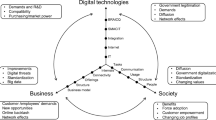Abstract
The long-term consequences of the digital transformation associated with the further development of digital technologies and business models are difficult to predict. The developments are fast, diverse, complex and often contradictory. What is certain, however, is that we are in the midst of a fundamental process of change that is affecting the economy, politics, science, society and individuals, and that goes far beyond the technological developments initially perceived. The significance of the process of change for coexistence can be compared with the invention of letterpress printing. People are affected by the digital transformation in different ways and develop different attitudes and behaviour. A great variety of ‘digital living worlds’ is created. To the extent that, on the one hand, all areas of life are increasingly affected by digitization, on the other hand, efforts to preserve or regain one’s own autonomy in the digitized world are growing. However, since it will not be possible to escape the digital transformation, the best option is to actively shape the digitisation or digital transformation of one’s own living environment.
Access this chapter
Tax calculation will be finalised at checkout
Purchases are for personal use only
Similar content being viewed by others
References
Baecker, D. (2007). Studien zur nächsten Gesellschaft. Berlin: Suhrkamp.
Deutsches Institut für Vertrauen und Sicherheit im Internet DIVSI (2018a): DIVSI Internet-Milieus 2016. Die digitalisierte Gesellschaft in Bewegung. Hamburg: DIVSI.
Deutsches Institut für Vertrauen und Sicherheit im Internet DIVSI (2018b): DIVSI-U25-Studie. Euphorie war gestern. Die „Generation Internet“ zwischen Glück und Abhängigkeit. Hamburg: DIVSI.
Edler, D., Jenal, C., & Kühne, O. (2020a). Modern approaches to the visualization of landscapes—An introduction. In D. Edler, C. Jenal, & O. Kühne (Eds.), Modern approaches to the visualization of landscapes (pp. 3–15). Wiesbaden: Springer VS.
Edler, D., Keil, J., & Dickmann, F. (2020b). From Na Pali to Earth—An ‘Unreal’ engine for modern geodata? In D. Edler, C. Jenal, & O. Kühne (Eds.), Modern approaches to the visualization of landscapes (pp. 279–291). Wiesbaden: Springer VS.
Gizmodo (2019). Kashmir Hill: How cartographers for the U.S. military inadvertently created a house of horrors in South Africa. Retrieved on 23 Dec 2019 from https://gizmodo.com/how-cartographers-for-the-u-s-military-inadvertently-c-1830758394.
Harari, Y. N. (2017). Homo Deus. Eine Geschichte von morgen. München: C. H. Beck.
Kleber, A., Edler, D., & Dickmann, F. (2020). Cartography and the sea: A javascript-based web mapping application for managing maritime shipping. In D. Edler, C. Jenal, & O. Kühne (Eds.), Modern approaches to the visualization of landscapes (pp. 173–186). Wiesbaden: Springer VS.
Kobek, J. (2016). Ich hasse dieses Internet. Ein nützlicher Roman. Berlin: S. Fischer.
Kühne, O. (2017). Landschaft und Wandel: Zur Veränderlichkeit von Wahrnehmungen. Wiesbaden: Springer. VS.
Kühne, O. (2019). Landscape theories: A brief introduction. Wiesbaden: Springer VS.
Kühne, O., & Jenal, C. (2020). The threefold landscape dynamics—Basic considerations, conflicts and potentials of virtual landscape research. In D. Edler, C. Jenal, & O. Kühne (Eds.), Modern approaches to the visualization of landscapes (pp. 389–402). Wiesbaden: Springer VS.
Lanier, J. (2018). 10 Gründe, warum du deine Social Media Accounts sofort löschen musst. Hamburg: Hoffmann und Campe.
Meyer-Heß, F. (2020). Discovering forgotten landscapes. In D. Edler, C. Jenal, & O. Kühne (Eds.), Modern approaches to the visualization of landscapes (pp. 33–45). Wiesbaden: Springer VS.
New York Times (2019). Pagan Kennedy: The land where the internet ends. Retrieved on 23 Dec 2019 from https://www.nytimes.com/2019/06/21/opinion/sunday/wifi-wilderness-privacy-reserves.html?utm_source=pocket&utm_medium=email&utm_campaign=pockethits.
Newport, C. (2019). Digitaler Minimalismus. München: Redline Verlag.
re:publica (2019). Mikael Colville-Andersen: Back to the future in urban design. Retrieved on 22 Dec 2019 from https://www.youtube.com/watch?v=luzA74TgJI8.
Reckwitz, A. (2017). Die Gesellschaft der Singularitäten: Zum Strukturwandel der Moderne. Berlin: Suhrkamp.
Rosa, H. (2013). Beschleunigung und Entfremdung. Berlin: Suhrkamp.
Rosa, H. (2019). Resonanz. Eine Soziologie der Weltbeziehung. Berlin: Suhrkamp.
Siepmann, N., Edler, D., & Kühne, O. (2020). Soundscapes in cartographic media. In D. Edler, C. Jenal, & O. Kühne (Eds.), Modern approaches to the visualization of landscapes (pp. 247–263). Wiesbaden: Springer VS.
Stratmann, J., Ristea, A., Leitner, M., & Paulus, G. (2020). Exploring urban “Blightscapes” applying spatial video technology and geographic information system: A case study from Baton Rouge, USA. In D. Edler, C. Jenal, & O. Kühne (Eds.), Modern approaches to the visualization of landscapes (pp. 499–517). Wiesbaden: Springer VS.
Taleb, N. N. (2018). Der Schwarze Schwan: Die Macht höchst unwahrscheinlicher Ereignisse. München: Pantheon.
Vetter, M. (2020). Technical potentials for the visualization in virtual reality. In D. Edler, C. Jenal, & O. Kühne (Eds.), Modern approaches to the visualization of landscapes (p. 307–317). Wiesbaden: Springer VS.
Author information
Authors and Affiliations
Corresponding author
Editor information
Editors and Affiliations
Rights and permissions
Copyright information
© 2020 Springer Fachmedien Wiesbaden GmbH, part of Springer Nature
About this chapter
Cite this chapter
Thomas, P.M. (2020). The Digitalizing Societys—Transformations and Challenges. In: Edler, D., Jenal, C., Kühne, O. (eds) Modern Approaches to the Visualization of Landscapes. RaumFragen: Stadt – Region – Landschaft. Springer VS, Wiesbaden. https://doi.org/10.1007/978-3-658-30956-5_25
Download citation
DOI: https://doi.org/10.1007/978-3-658-30956-5_25
Published:
Publisher Name: Springer VS, Wiesbaden
Print ISBN: 978-3-658-30955-8
Online ISBN: 978-3-658-30956-5
eBook Packages: Social SciencesSocial Sciences (R0)




